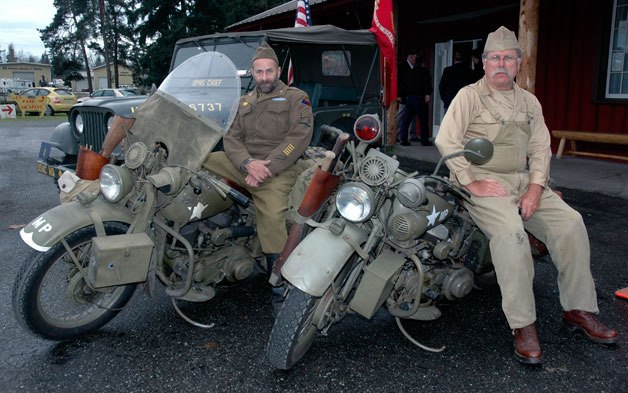ARLINGTON — Although Dec. 7 marks the anniversary of the Japanese attack on Pearl Harbor, the Stillaguamish Valley Pioneer Hall and Museum takes time during the day to honor the service of all American military members as part of its annual “Military Day.”
This year’s ceremony featured an old practice that was new to the Pioneer hall, as well as a lively discussion among the veterans in attendance about the meaning of their service.
Members of Arlington American Legion Post 76 brought the POW/MIA remembrance ceremony to this year’s Military day, as Chaplain Keith Reyes joined fellow Legion Post 76 member Betty Nelson in explaining the significance of the empty table, representing all the military members who have been prisoners of war or gone missing in action.
When Reyes opened the floor for veterans to speak, retired soldiers Eliseo Garcia and Dick Prouty each offered unique perspectives on their respective tours of duty in Korea, during what’s since become known as America’s “forgotten war.”
Prouty, a former Army engineer whose son and grandson entered the same branch of service, laughed as he recalled the Koreans’ attempts to approximate American English with signs that read, “No smoRking.” He chuckled as he acknowledged that the Korean war was still considered a “military police action” until 1958, well after he’d been promoted from second lieutenant to lieutenant during his nine-month stint there, but Garcia was decidedly less sanguine about it.
“The 23rd Infantry broke the back of the Chinese before it was even declared a war,” said Garcia, a retired command sergeant major and member of Arlington Veterans of Foreign Wars Post 1561. “The World War II veterans got publicity, and even the Vietnam veterans got publicity, but with the Korean war veterans, so many people don’t even know what we went through. We lost close to 57,000 of our boys in Vietnam in 10 years, but we lost more than 54,000 in three years in Korea.”
Garcia and Prouty’s years in Korea sharply contrast one another. Before Prouty left Korea, he was presented with a tea set, engraved with his name, made from surplus artillery shells.
“I’d love to see Korea now,” Prouty said. “It was a beautiful country. Seoul was completely bombed out, until its buildings were just shells, but I hear they’ve done amazing rebuilding. I hope to get back there someday.”
From 1950-1951, Garcia’s path went from Pusan, through Kunu-ri and Chipyongi, to the Spring Offensive in Korea. He’d lied about his age to enlist at 15, and from the ages of 16-17, he served a squad leader in Company L, 23rd Infantry Regiment, 2nd Infantry Division. On Sept. 16, 1950, he knocked out two North Korean machine gun positions on the Naktong River, wounding him but earning him the Distinguished Service Cross, the nations second-highest military honor, and one of many awards and decorations he received during his time in service.
VFW Post 1561 Cmdr. Bill Morse asked the veterans in attendance to consider sharing their stories with young people, citing the reactions he’d received from speaking at schools.
“At least a few in each group will take the next step to start learning about military history on their own,” Morse said. “I don’t want anyone to feel like they’re being forced to talk, but if you’re willing to talk, there will be young people who will love to listen. My dad didn’t talk about his experiences in the service, and I wasn’t smart enough to ask. Maybe he wouldn’t have been comfortable talking about, but then again, maybe he would.”
Reyes urged veterans and civilians alike to support their military members, regardless of their opinions about the wars they fight.
“They’re not politicians,” Reyes said. “We should honor our vets, from WWII and Korea on up through Vietnam and the current global war on terror. I’ve heard people compare 9/11 to the bombing of Pearl Harbor, and I’m not sure that you can, but in either case, the saddest thing we could do would be to forget.”








